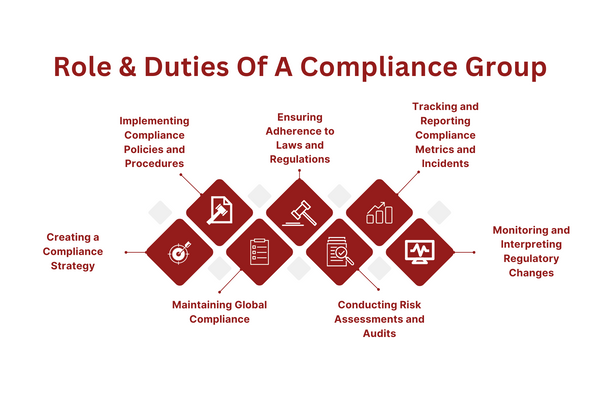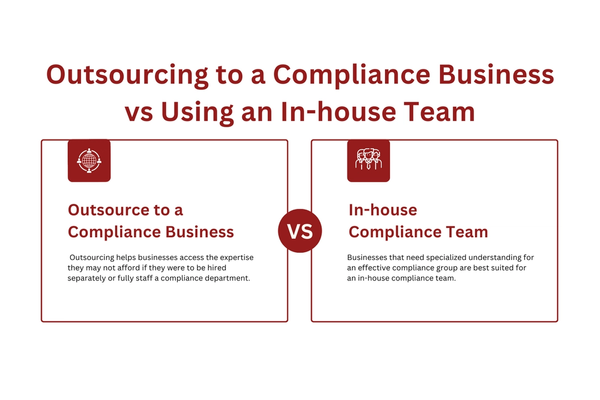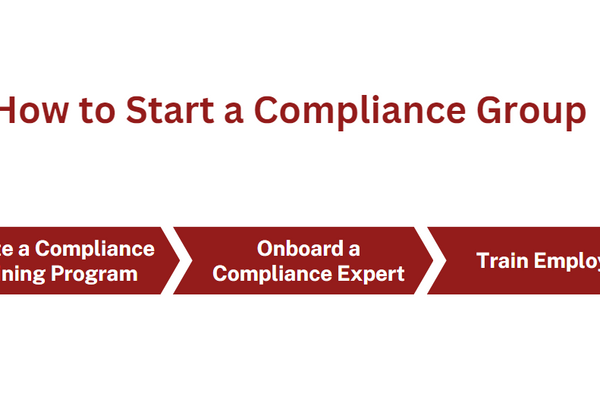
A compliance group dedicated to your business interests is indispensable. Most businesses, especially small-scale ones, assume they do not need a compliance group or need clarification about what it entails and how to set up one.
In this article, we will explain what a compliance group is, its roles and duties, and whether you should build one in-house or outsource to an external compliance group.
Let’s dive right in.
What Does a Compliance Group Do?
A compliance group is a department that ensures a business keeps to internal and external standards established by industry or regulatory oversight.
The compliance group, part of the Governance, Risk, and Compliance (GRC), may be a department for large-scale businesses, while for small-scale and new businesses, the compliance group may be just an individual, often the general counsel.
One common myth is that a compliance group handles every compliance in a business. However, a good word to describe what a compliance group does is “coordination.”
Compliance groups help businesses coordinate their compliance efforts so they do not get on the wrong side of the law.
While a dedicated department or individual is steering the coordination, other departments may handle specific compliance operations.
For example, the information technology (IT) department handles cybersecurity, data protection, and privacy compliance, and the legal department handles intellectual property and antitrust compliance.
Depending on the size of the business industry, a compliance group may go by different names, including compliance department, compliance officer, compliance consultant, and compliance associate.
Role & Duties Of A Compliance Group
Role & Duties Of A Compliance Group.png

Now that you know what a compliance group is and what they do, their roles and duties are below.
A compliance group’s roles and duties are broad, from drafting and implementing a compliance strategy to auditing and reporting compliance policies and practices and regulatory threat intelligence.
Here are the primary role and duties of a compliance group:
Creating a Compliance Strategy
For clarity and continuity’s sake, developing a strategy is a compliance group’s first role and duty.
The compliance strategy will clarify what areas of the business need compliance attention, how to respond to incidents, and who handles what. Employees and business models are not permanent fixtures.
When creating a compliance strategy, the business must identify all the laws and regulations affecting its operation with a compliance framework.
Implementing Compliance Policies and Procedures
For a newly created compliance group, the first line of action after making a compliance strategy is to draft the code of conduct policy document for the business and its employees.
The code of conduct will inform employees’ expectations, including executives and board members, when carrying out their day-to-day tasks, dealing with other employees, and interacting with consumers.
Besides the code of conduct, there are many other policy documents, some statutorily required and others mandated by industry standards.
While similar businesses having similar business models may have similar policy documents, we discourage simply copying and pasting the policy documents of another business. Each business is different and should reflect this uniqueness in its policy documents.
Ensuring Adherence to Laws and Regulations
Applicable laws and regulations always enumerate several rights and obligations for the business they cover.
For example, adhering to privacy laws requires having a privacy notice and a privacy policy, with the former between the business and the public and the latter an internal document. In the spirit of a proactive approach, compliance groups incorporate adherence even from the stage of building the product.
Maintaining Global Compliance
Compliance groups focus not only on the headquarters but also ensures the compliance ripples stream down to all the foreign business locations.
One easy way to achieve this and prove compliance with foreign legislators is to translate policies and other relevant documents into the main languages in those locations. Translations could extend beyond business locations and also apply to the native languages of all employees.
You’ll also need to follow any additional laws and regulations of these foreign countries.
Conducting Risk Assessments and Audits
As mentioned, compliance may be coordinated by the compliance group but executed by a relevant department.
In the same vein, to ensure closing all the gaps, the compliance group will conduct risk assessments, including questionnaires or face-to-face interviews, to dig deeper into areas needing compliance attention.
Monitoring and Interpreting Regulatory Changes
With rapidly changing laws and technological developments, regulatory intelligence has become essential as it could be the difference between a business’s rise or fall.
For example, European regulations on cookies could impact businesses with advertising business models.
Tracking and Reporting Compliance Metrics and Incidents
Metrics is one way to monitor progress and know where to improve. By default, implementing a compliance strategy will involve documentation, whether by drafting policies or efforts toward standardization.
The Importance of Having a Compliance Group
As seen in the roles and duties of a compliance group, a compliance group does a lot of things. Here’s what those things can do for a business:
Limit Legal Liabilities
Compliance often involves meeting some internal and external standards that could be obligations set by industry or a regulation.
Regulations often have civil or criminal penalties such as fines, loss of operating license, business closure, or even prison sentences.
Prevention is better than a cure, especially with compliance, and simply complying would eliminate or at least limit any legal liabilities.
Culture of Trust and Accountability
Compliance assures regulators and consumers that their products and services are okay to use.
Internally, businesses can build a culture of trust and accountability because compliance is not a one-person effort but a collaboration by all employees, from sales agents to manufacturing engineers.
This culture of trust spreads outside the business to the consumers they serve as compliance assures consumers that such brands are to be trusted.
Outsourcing to a Compliance Business vs Using an In-house Team
Outsourcing to a Compliance Business vs Using an In-house Team.png

Now you are convinced having a compliance group is not up for debate, and your next question might be whether to go internal or external.
In this section, we will help you decide whether to outsource to a compliance business or use an in-house team. Your choice will depend on the stage of your business and the size of the business.
Outsource to a Compliance Business
Considering the complexity of compliance for some industries, businesses looking to save time and money should opt for outsourcing to a compliance business.
Compliance businesses often offer all-in-one or bundled services that leverage economies of scale because they have all the specialized skills. Outsourcing helps businesses access the expertise they may not afford if they were to be hired separately or fully staff a compliance department.
Regulations and business developments happen fast, making it difficult for a one or two-employee staffed compliance group to stay on top of happenings.
Unfortunately, outsourcing does not guarantee compliance, so businesses need to be aware of the compliance business they outsource to. We recommend using a business that specializes in your business’s industry.
Outsourcing is a good fit for businesses that don’t require super-specialized understanding of how the business works. It’s also easier to access fast and affordable expertise rather than taking on the cost and delay of training full-time staff.
In-house Compliance Team
Businesses that need specialized understanding for an effective compliance group are best suited for an in-house compliance team.
In-house also extends to businesses that deal in a large amount of sensitive, confidential data, making it necessary to handle compliance in-house to hedge data breach risks.
Which is Better?
Deciding the better option between outsourcing to a compliance business or setting up an in-house compliance team will depend on the business’s needs. If you’re a larger business in a high-risk environment, then an in-house team will be better. For smaller businesses that are low to medium risk, outsourcing is typically the best option.
Also, it is possible to go hybrid, where some compliance involving sensitive, confidential information is handled in-house, and other parts are outsourced.
How to Start a Compliance Group
How to Start a Compliance Group.png

Starting a compliance group for a business might seem daunting, considering the complexity and time commitment involved.
Alternatively, businesses can skip all the time-wasting and expensive hurdles in starting a compliance group and subscribe to a compliance-in-a-box solution with Captain Compliance.
Compliance businesses that offer this solution give businesses a readymade solution to all regulatory and industry compliance needs.
Whether a business compliance element is reporting, incidence management, policy drafting, regulatory intelligence, monitoring, standby support, etc., all requirements are met in a one-stop shop compliance-in-a-box solution.
Getting back into starting a compliance group, the steps below will help anyone achieve a compliance group in record time.
Obtain Support from Management
This is the first step because, with management support, it will be easier to get budget approvals and inspire a culture of trust and accountability in employees.
Create a Compliance Training Program
There is no compliance in isolation. All departments and employees need to play their roles. To ensure good collaboration and eliminate resources going to waste, everyone needs to be on the same page around the topic of compliance.
The simple way to do this is through a training program. Employees need to know what to do, when to do it, and why they do it.
Onboard a Compliance Expert
Compliance often requires nuanced expertise that can only come from a high-quality employee or a high-quality compliance business.
So, it is essential to get it right with the right hire for the compliance group, whether in-house or outsourced. Failure to do so makes the business liable for penalties, not the employee or the compliance business.
Train Employees
Sometimes, rather than new hires, existing employees could be trained to add compliance to their skill sets or transition to a compliance role. Classic candidates for this are often members of the legal department.
Monitor Compliance Efforts
We can only improve what we monitor. Documentation during compliance strategy implementation is essential. Monitoring compliance efforts makes it easier to prove compliance whenever needed, make processes more efficient, and know what is working or not.
FAQs
What is a compliance group?
A compliance group is a department or personnel that helps a business stay on top of internal and external standards to be in the good books of industry and regulators.
Is setting up a compliance group expensive?
Compliance groups can often cost a fair bit, especially if it’s in-house. However, considering the savings from monetary and reputational loss, compliance is definitely worth it.
Should a business hire a compliance group in-house or outsource to a compliance business?
Whether to hire in-house or outsource is a question that depends on the business’s unique needs, budget, and size.
When does a business need a compliance group?
Ideally, a business must have a compliance group before selling to or gaining the first lead or consumer.
For some industries, compliance is baked into the business or operational license grant. Compliance only kicks in for some others when the business grows above a certain threshold.
For example, the GDPR requirement to appoint a data protection officer applies only to businesses with over 250 employees.
What happens if a business does not have a compliance group?
If a company does not have a compliance group, then that business is at a much higher risk of lawsuits and other challenges.
Closing
Consumer protection laws are increasing everywhere, and making compliance mandatory as the alternative is not something you want to deal with.
In this article, we showed you how compliance groups help ensure the smooth running of your business by keeping up with the ever-changing regulatory landscape.